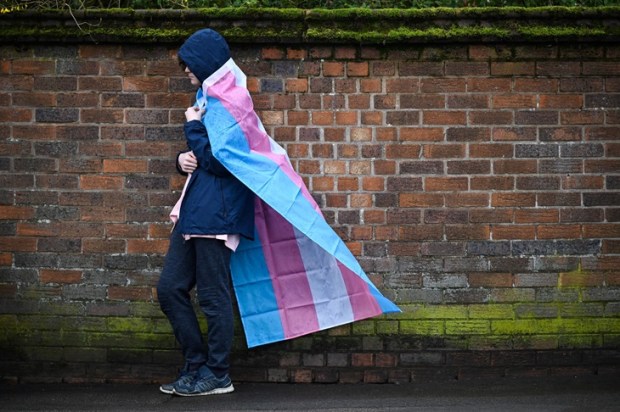‘Yeah, the good news is that this is a right-wing source that is probably blowing it out of proportion. But it does feel like we might be getting to the breaking-d*cks-off-statues phase of society again.’
Or so went a recent comment on a Reddit forum discussing the censorship of Ladybird’s fairy tales series.
It’s a slightly clunky if not accurate reference to the stump-less marble lads littered throughout the Vatican and other European museums. Each carved figure has their butchered manhood covered by a decorative fig leaf, no doubt to hide the shame of the person who took a chisel to these ancient works of art. It was part of a Medieval campaign to protect modesty that was still going under the reign of Pope Pius IX (1846-1878) in which statues from antiquity were desecrated to serve the sensitivities of the modern age.
Which is exactly what the Woke are doing today. They have appointed themselves ‘Pope’ and started hacking off bits of Western culture that offend their delicate sensitives (and these are a class of people that specialise in finding ways to be offended). It is so strange that progressive minds claiming to be above religion seem determined to revive a behaviour that the Church has long since dispensed with. Around 1.3 million people flock to the Galleria dell’Accademia to gaze at David’s bits, so why can’t we keep the odd prince and princess love story intact?
Wokism is the new religion and it flexes its power by harming anything that threatens its worldview.
And to be fair, the Church has absolutely nothing on today’s censors. Sensitivity readers (along with other digital moderators and entertainment revisionists) are far more extreme, unhinged, and insidious. Their behaviour is closer to that of Mao’s enforcers during the Cultural Revolution in which anything that offended, contested, or upset the new ideology had to go. This is not surprising, considering both movements find their beginnings in collective ideology.
Having moved on from bleaching James Bond and Roald Dahl, the sensitivity readers in the publishing industry have turned to fairy tales.
Many of us have fond memories of those red-and-black-spotted books published between the mid 60s and late 90s. All of my Ladybird fairy tales are in storage kept – jokingly at first – in case the next generation of our family didn’t have access to old stories.
The purpose of the Ladybird series is to help young children learn how to read while sharing pieces of European culture as told through traditional fairy tales such as Cinderella, Sleeping Beauty, Tom Thumb, Pinocchio, Rapunzel, Little Red Riding Hood, Jack and the Beanstalk etc.
Fairy tales have never pretended to present a ‘virtuous utopia’ to children. They are meant as lessons and warnings, often teaching children about terrible danger in a PG-13 way. Children have always been robust enough to survive the Ladybird series – until now.
And while you might think, ‘Yeah, I guess the whole wolf trying to eat the little girl thing is a bit scary…’ That’s not what the censors are coming after.
Their problem?
Love at first sight. In Sleeping Beauty (and other similar tales) the idea that a prince might find a straight, white, biological female attractive without speaking to her is ‘problematic’ and conveys beauty ideals that are ‘privileged’. Oh, and god forbid the prince assumes the princess’ pronouns! He’s not allowed to guess that she’s a she/her without asking which he cannot do unless he wakes her up with a kiss but without her permission, that is basically rape. Being royalty is also a problem, because her status as a princess is being used to calculate her worthiness of love – that’s unacceptable.
Credit to the DailyMail. Their commentary on this is utterly hilarious. They write:
The Penguin-owned publisher’s catalogue includes classic tales such as Cinderella and Sleeping Beauty – but the characters and plots have been identified as ‘outdated or harmful’.
Industry insiders claim problematic tropes include a lack of diversity among blonde-haired and blue-eyed protagonists.
There are also fears of class discrimination due to the social rank of princes and princesses, ageism as villains are usually old, and a lack of racial diversity among main characters.
‘Love at first sight’ romances could also be erased due to the protagonists falling for each other before they have spoken.
It is feared that these tropes may suggest to children that good looks alone make someone worthy of attention and romance.
The characters’ presumption of gender pronouns at first sight has also been raised as an issue.
For example, when a princess uses the term ‘man’ upon seeing a prince for the first time before they have got to know each other, with gender-neutral language said to be preferred.
It’s probably annoying to the Marxists lurking inside the school system that their classrooms are full of little girls dressed up as princesses, dreaming of finding their future husband and settling down into a happy, normal marriage when they’re older. This doesn’t fit with the Woke view of the world. Nor does the image of men who want to be princes, defending women and defeating monsters. That’s probably toxic masculinity.
The problem with sensitivity readers, as a profession, is that they essentially get paid to find fault. Imagine if a sensitivity reader kept coming back without finding anything wrong with the books under review – what would be the point of their existence? They’re like politicians who are paid to implement policy regardless of whether it is needed and so Western nations are drowning in mindless legislation.
Sensitivity readers didn’t exist when the greatest works of fiction were being written because none of them would have made it through the ‘I’m so offended by everything’ mob.
Good stories cannot be looking over their shoulder, calculating every fictional interaction from the fragile mindset of the Tumblr generation. It’s no wonder the quality of modern writing is terrible. And no, I don’t care how much ‘expert knowledge’ a sensitivity reader has, that does not qualify them to edit the voice of another human being. If they want to contribute, they can write their own works of fiction instead of assaulting other people’s masterpieces. The problem is that these ultra-Woke authors know that no matter how many pitch-perfect stories they write, people are still going to pick up the ‘problematic’ Ian Fleming novel. Why? Because people don’t like sanitised snooze-fests. It’s why feminist comedians are unfunny and modern art is a pile of garbage.
This is not the first time culture has been taken by the neck and squeezed. (Sorry, was that a ‘problematic’ bit of imagery?)
Science fiction essentially started because writers were too afraid to describe the dystopian nature of reality. They shifted their commentary to fictional worlds where no one could be offended, but the smart readers could draw parallels to the real world and its dictatorships. Like fairy tales, science fiction was largely written as a warning to future generations.
Perhaps the next generation of writers will have to re-imagine fiction and use clever stories to disguise criticism of this Woke regime that is happy to wield the hammer and chisel…
There is an interesting conversation from Mumsnet.com from 2009 where a parent was alarmed when reading Hansel and Gretel to their three-year-old.
‘I had forgotten how horrid the story is – what with children being abandoned by their parents in the forest, a witch imprisoning Hansel so she can fatten him up and eat him, the witch herself getting pushed in the oven at the end… I tried to gloss over the scary bits as much as possible, but it got me thinking. I guess I must have been told this story in my early childhood. Is three too young for the themes in this story? At what age would you introduce stories like this? DD is very taken by the house made out of sweets so I think I will request it again, just now sure how much I need to “censor” it!’
Which misses the point. The idea of Hansel and Gretel is to warn children who might be enticed by houses made out of sweets that nothing is free and that it is almost certainly a trap. It’s basically a retelling of ‘don’t take candy from strangers’ in a way that children might actually remember to heed the warning. In censoring the story, the parent may teach their child that houses made of sweets have no consequences.
As one respondent said, ‘They are cautionary tales, so they are meant to be a bit scary. They lose their point if you censor them.’
Thankfully this particular parent saw the merit in telling the story and came to the conclusion that they are against censorship.
If only today’s world had the common sense of 2009. If you don’t like a book – put it down. The second you start up a bonfire, you’ve become the mad old cannibalistic witch in the fairy tale.
Alexandra Marshall is an independent writer. If you would like to support her work, shout her a coffee over at donor-box.
Got something to add? Join the discussion and comment below.
Get 10 issues for just $10
Subscribe to The Spectator Australia today for the next 10 magazine issues, plus full online access, for just $10.


























Comments
Don't miss out
Join the conversation with other Spectator Australia readers. Subscribe to leave a comment.
SUBSCRIBEAlready a subscriber? Log in